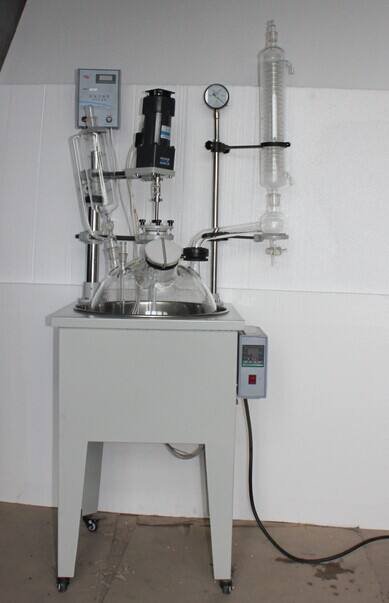Essential Tips for Maintaining Your Single Glass Reactor for Long-lasting Performance and Efficiency
A single glass reactor is an indispensable tool in many laboratory settings, often used for reactions requiring precise temperature, pressure, and agitation control. To ensure that the reactor operates efficiently and continues to meet the high demands of laboratory work, regular maintenance is essential. Knowing the best Single Glass Reactor Maintenance Tips can help keep the reactor functioning at its best, extending its life and ensuring that your lab’s work progresses without unexpected interruptions.

1. The Importance of Single Glass Reactor Maintenance Regular Single Glass Reactor Maintenance Tips are vital for the longevity and optimal performance of the equipment. Without regular care, the reactor’s performance can degrade, leading to inaccurate results or even damage to the system. Regular inspections and cleaning can prevent common issues such as leaks, loss of pressure, or overheating. Maintenance can also catch minor problems before they become major concerns, helping avoid costly repairs or replacements.
2. Cleaning Your Single Glass Reactor One of the most important Single Glass Reactor Maintenance Tips is keeping it clean. Chemical residues from previous experiments can affect the efficiency of the reactor, so a thorough cleaning should be performed after every use. Pay special attention to the glass surface and stirrer. Residues or build-ups can obstruct performance or cause contamination in future experiments. A gentle yet thorough cleaning regimen will maintain the integrity of the glass and all connected components.
It’s also a good practice to inspect the glass for any visible damage or wear during the cleaning process. Cracks or chips can compromise the reactor’s safety and functionality. If you notice any damage, it is best to address it immediately to avoid any accidents or downtime.
3. Inspecting Seals and Gaskets For a single glass reactor to function properly, the seals and gaskets play a critical role. Over time, these components can wear down, leading to leaks or malfunctioning equipment. Regular inspection of these seals and gaskets is one of the most crucial Single Glass Reactor Maintenance Tips. Check for any signs of cracking, warping, or wear that could lead to leaks, particularly around the joints and connections. Replacing faulty seals can prevent unnecessary damage and keep the system functioning smoothly.
4. Lubricating Moving Parts Many single glass reactors feature moving parts, such as stirrers or agitators. Proper lubrication of these components is necessary for their smooth operation. Without lubrication, friction can cause parts to wear down quickly, potentially resulting in malfunction or failure. Using the correct lubricants for your system will keep the moving parts working efficiently and prevent unnecessary wear.
Ensuring the stirrer operates smoothly is essential for maintaining the precision of your reactor. Regular lubrication helps maintain consistency in reaction times and promotes the reliability of the equipment.
5. Monitoring Temperature and Pressure In a single glass reactor, maintaining the correct temperature and pressure is crucial for accurate reactions. Temperature fluctuations or improper pressure can interfere with the experiment’s outcomes and damage the reactor itself. Regularly checking the temperature and pressure gauges as part of your Single Glass Reactor Maintenance Tips will help ensure that they are calibrated and functioning correctly. Ensure that the temperature controls are responding accurately to set points and that pressure levels remain within safe operating limits.
6. Preventing Leaks Leaks are one of the most common issues faced in single glass reactor systems. Over time, seals can deteriorate, and connections may loosen, leading to leaks. To prevent this, ensure that you regularly inspect all connections, particularly around the joints and gaskets. If leaks are detected, it’s important to replace the damaged seals or adjust the fittings. Ensuring that your reactor is leak-free is a crucial Single Glass Reactor Maintenance Tip for maintaining safety and performance. Leaks can lead to a loss of valuable reagents, which can impact your experiments and laboratory efficiency.
7. Proper Storage and Handling When not in use, storing your single glass reactor properly is essential to prolonging its lifespan. Always ensure that it is stored in a dry, clean environment to prevent contamination or damage. Avoid storing the reactor in places where it could be subject to physical shock, such as dropping or impacts, which can cause cracks or damage. Proper handling during storage and transportation is another important factor in the Single Glass Reactor Maintenance Tips you should follow.
8. Upgrading and Replacing Parts Like any piece of equipment, single glass reactors may require occasional upgrades or part replacements to maintain peak performance. Components such as the motor, heating elements, or pressure valves may wear down over time and need to be replaced. It’s important to know when to replace parts before they fail. Having a plan in place for upgrades and spare parts ensures your reactor will stay operational without interruptions. It’s one of the key Single Glass Reactor Maintenance Tips for ensuring continuous use of the equipment.
9. Professional Servicing While many of the Single Glass Reactor Maintenance Tips can be carried out by lab personnel, there are occasions when professional servicing is necessary. Trained technicians can perform deep inspections, calibrations, and repairs that go beyond routine maintenance. This ensures that every component of the reactor is functioning properly and that your system is as efficient as possible. If you’re unsure about certain aspects of reactor maintenance, it’s wise to consult experts or reach out to your reactor’s manufacturer for support.
Conclusion Maintaining your single glass reactor is vital for ensuring consistent, reliable performance in the laboratory. By following the Single Glass Reactor Maintenance Tips outlined here, you can extend the life of your equipment, minimize downtime, and improve the efficiency of your laboratory operations.
For more information on how to properly care for your reactor or to explore new equipment options, visit EquilRxnLab’s product page for the Single Layer Glass Reactor or contact us for expert support.
Links for further reference:



